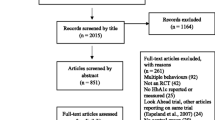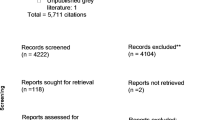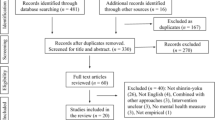Abstract
The incidence of type 2 diabetes mellitus (T2DM) has been categorized as a worldwide epidemic and indigenous populations experience disproportionately higher rates. Stress is a factor in both the development and maintenance of T2DM, and stress is common in the lives of indigenous people. Previous research indicates that mindfulness-based interventions (MBI) can improve health outcomes for diabetes patients, and we hypothesized that the mind/body approach of MBIs would be appropriate for, and acceptable to, indigenous people whose healing traditions incorporate aspects of mind, body, and spirit. Our previous quantitative investigation revealed both statistically and clinically significant health improvements in Aboriginal participants (N = 11) recruited from urban and rural centers in Manitoba, Canada. In this qualitative study, we set out to determine the acceptability, suitability, and perceived value of the MBI through the reported subjective experiences of these participants. Data obtained through semi-structured interviews were analyzed using the framework analytic approach and revealed several salient categories and subcategories under the main themes of factors related to participation, including motivating factors and barriers; outcome, including perceived benefits and evaluations of the program and its practices; and directions for future programs. Overall, the results indicate that the Aboriginal participants valued the lessons, practices, and perceived benefits of the program and they found the MBI culturally acceptable and suitable to their needs.

Similar content being viewed by others
References
Baer, R. A. (2003). Mindfulness training as a clinical intervention: a conceptual and empirical review. Clinical Psychology: Science and Practice, 10, 125–143.
Braun, V., & Clarke, V. (2006). Using thematic analysis in psychology. Qualitative Research in Psychology, 3(2), 77–101.
Cairns, V., & Murray, C. (2013). How do the features of mindfulness-based cognitive therapy contribute to positive therapeutic change? A meta-synthesis of qualitative studies. Behavioural and Cognitive Psychotherapy. doi:10.1017/s1352465813000945. Advance online publication.
Creswell, J. W. (2009). Research design: qualitative, quantitative, and mixed methods approaches (3rd ed.). Thousand Oaks: Sage.
Dreger, L. C., Mackenzie, C., & McLeod, B. (2013). Feasibility of a mindfulness-based intervention for Aboriginal adults with type 2 diabetes. Mindfulness. doi:10.1007/s12671-013-0257-z. Advance online publication.
Duran, E., Fox Davis, L., & Allione, T. (2008). Indigenous dharma: Native American and Buddhist voices. In B. Gates & W. Nisker (Eds.), The best of inquiring mind: 25 years of dharma, drama, and uncommon insight (pp. 297–303). Sommerville: Wisdom Publications.
First Nations Centre. (2007). OCAP: Ownership, Control, Access and Possession. Sanctioned by the First Nations Information Governance Committee, Assembly of First Nations. Ottawa: National Aboriginal Health Organization.
French, L. A. (2004). Alcohol and other drug addictions among Native Americans: the movement toward tribal-centric treatment programs. Alcoholism Treatment Quarterly, 22, 81–91.
Frohlich, K. L., Ross, N., & Richmond, C. (2006). Health disparities in Canada today: some evidence and a theoretical framework. Health Policy, 79, 132–143.
Giles, B. G., Findlay, C. S., Haas, G., LaFrance, B., Laughing, W., & Pembleton, S. (2007). Integrating conventional science and aboriginal perspectives on diabetes using fuzzy cognitive maps. Social Science and Medicine, 64, 562–576.
Gone, J. P. (2009). A community-based treatment for Native American historical trauma: prospects for evidence-based practice. Journal of Consulting and Clinical Psychology, 77(4), 751–762.
Greeson, J. M. (2008). Mindfulness research update: 2008. Complementary Health Practice Review, 14(1), 10–18.
Grossman, P., Niemann, L., Schmidt, S., & Walach, H. (2004). Mindfulness-based stress reduction and health benefits: a meta-analysis. Journal of Psychosomatic Research, 57, 35–43.
Hartmann, M., Kopf, S., Kircher, C., Faude-Lang, V., Djuric, Z., Augstein, F., & Nawroth, P. P. (2012). Sustained effects of a mindfulness-based stress-reduction intervention in type 2 diabetic patients design and first results of a randomized controlled trial (the Heidelberger diabetes and stress-study). Diabetes Care, 35(5), 945–947.
Hodge, F. S., Weinmann, S., & Roubideaux, Y. (2000). Recruitment of American Indians and Alaska Natives into clinical trials. Annals of Epidemiology, 10(8), S41–S48.
Iwasaki, Y., Bartlett, J., & O’Neil, J. (2005). Coping with stress among Aboriginal women and men with diabetes in Winnipeg, Canada. Social Science & Medicine, 60, 977–988.
Kabat-Zinn, J. (1990). Full catastrophe living: using the wisdom of your body and mind to face stress, pain, and illness. New York: Dell Publishing.
Kabat-Zinn, J. (2003). Mindfulness-based interventions in context: past, present, and future. Clinical Psychology: Science and Practice, 10(2), 144–156.
Keyworth, C., Knopp, J., Roughley, K., Dickens, C., Bold, S., & Coventry, P. (2013). A mixed methods pilot study of the acceptability and effectiveness of a brief meditation and mindfulness intervention for people with diabetes and coronary heart disease. Behavioural Medicine. doi:10.1080/08964289.2013.834865. Advance online publication.
Lam, D. W., & LeRoith, D. (2012). The worldwide diabetes epidemic. Current Opinion in Endocrinology, Diabetes, and Obesity, 19(2), 93–96.
Lammers, C. A., Naliboff, B. D., & Straatmeyer, A. J. (1984). The effects of progressive relaxation on stress and diabetic control. Behaviour Research and Therapy, 22(6), 641–650.
LeMaster, P. L., & Connell, C. M. (1994). Health education interventions among Native Americans: a review and analysis. Health Education Quarterly, 21(4), 521–538.
Lincoln, Y. S., & Guba, E. G. (1985). Naturalistic inquiry. Beverly Hills: Sage.
Lloyd, C., Smith, J., & Weinger, K. (2005). Stress and diabetes: a review of the links. Diabetes Spectrum, 18(2), 121–127.
Malpass, A., Carel, H., Ridd, M., Shaw, A., Kessler, D., Sharp, D., Bowden, M., & Wallond, J. (2012). Transforming the perceptual situation: a meta-ethnography of qualitative work reporting patients’ experiences of mindfulness-based approaches. Mindfulness, 3, 60–75.
McCabe, G. (2007). The healing path: a culture and community-derived indigenous therapy model. Psychotherapy: Theory, Research, Practice, Training, 44, 148–160.
McCabe, G. (2008). Mind, body, emotions, and spirit: reaching to the ancestors for healing. Counselling Psychology Quarterly, 21, 143–152.
McIntyre, M. (1996). Counseling and native healing. Asian Journal of Counseling, 19, 87–100.
Miller, C. K., Kristeller, J. L., Headings, A., & Nagaraja, H. (2013). Comparison of a mindful eating intervention to a diabetes self-management intervention among adults with type 2 diabetes: a randomized controlled trial. Health Education & Behavior. doi:10.1177/1090198113493092. Advance online publication.
Renfrey, G. S., & Dionne, R. R. (2001). Health psychology and the Native North American client. In S. S. Kazarian & D. R. Evans (Eds.), Handbook of cultural health psychology (pp. 343–387). San Diego: Academic.
Ringwalt, C., & Bliss, K. (2006). The cultural tailoring of a substance use prevention curriculum for American Indian youth. Journal of Drug Education, 36(2), 159–177.
Ritchie, J., & Spencer, L. (1994). Qualitative data analysis for applied policy research. In A. Bryman & R. G. Burgess (Eds.), Analyzing qualitative data (pp. 173–194). New York: Routledge.
Rock, M. (2003). Sweet blood and social suffering: rethinking cause-effect relationships in diabetes, distress, and duress. Medical Anthropology, 22, 131–174.
Roemer, L., & Orsillo, S. M. (2009). Mindfulness- and acceptance-based behavioral therapies in practice. New York: The Guilford Press.
Rosenthal, R. (2002). The Pygmalion effect and its mediating mechanisms. In J. Aronson (Ed.), Improving academic achievement: Impact of psychological factors on education (pp. 25–36). San Diego: Academic.
Rosenzweig, S., Reibel, D. K., Greeson, J. M., Edman, J. S., Jasser, S. A., McMearty, K. D., & Goldstein, B. J. (2007). Mindfulness-based stress reduction is associated with improved glycemic control in type-2 diabetes mellitus: a pilot study. Alternative Therapies in Health and Medicine, 13(5), 36–38.
Salmon, P., Sephton, S., Weissbecker, I., Hoover, K., Ulmer, C., & Studts, J. L. (2004). Mindfulness meditation in clinical practice. Cognitive and Behavioral Practice, 11(4), 434–446.
Salmon, P., Lush, E., Jablonski, M., & Sephton, S. E. (2009). Yoga and mindfulness: clinical aspects of an ancient mind/body practice. Cognitive and Behavioral Practice, 16(1), 59–72.
Santorelli, S., & Kabat-Zinn, J. (2009). Mindfulness-based stress reduction professional training resource manual. Center for Mindfulness in Medicine, Health Care, and Society, Division of Preventative and Behavioral Medicine, Department of Medicine, University of Massachusetts.
Shigaki, C. L., Glass, B., & Schopp, L. H. (2006). Mindfulness-based stress reduction in medical settings. Journal of Clinical Psychology in Medical Settings, 13(3), 209–216.
Statistics Canada. (1993). 1991 aboriginal peoples survey: language, tradition, health, lifestyle and social issues. Ottawa: Statistics Canada. Cat. No. 89–533.
Statistics Canada. (2011). National Household Survey, 2011. Aboriginal peoples in Canada: First Nations people, Metis, and Inuit. Ottawa: Statistics Canada. Cat. No. 99-011-X2011001.
Thompson, S. J., Gifford, S. M., & Thorpe, L. (2000). The social and cultural context of risk and prevention: food and physical activity in an urban Aboriginal community. Health Education and Behavior, 27(6), 725–743.
Tudor-Locke, C., Bell, R. C., Myers, A. M., Harris, S. B., Ecclestone, N. A., Lauzon, N., & Rodger, N. W. (2004). Controlled outcome evaluation of the First Step Program: a daily physical activity intervention for individuals with type II diabetes. International Journal of Obesity, 28, 113–119.
van Son, J., Nyklíček, I., Pop, V. J., Blonk, M. C., Erdtsieck, R. J., Spooren, P. F., Toorians, A. W., & Pouwer, F. (2013). The effects of a mindfulness-based intervention on emotional distress, quality-of-life, and HbA1c in outpatients with diabetes (DiaMind) a randomized controlled trial. Diabetes Care, 36(4), 823–830.
Vallejo, Z., & Amaro, H. (2009). Adaptation of mindfulness-based stress reduction program for addiction relapse prevention. The Humanistic Psychologist, 37, 192–206.
White, P., Smith, S. M., & O’Dowd, T. (2005). The role of the family in adult chronic illness: a review of the literature on type 2 diabetes. Irish Journal of Psychology, 26(1–2), 9–15.
Wyatt, C., Harper, B., & Weatherhead, S. (2014). The experience of group mindfulness-based interventions for individuals with mental health difficulties: a meta-synthesis. Psychotherapy Research, 24(2), 214–228.
Yellow Bird, M. (2013). Neurodecolonization: Applying mindfulness research to decolonizing social work. In M. Gray, J. Coates, M. Yellow Bird, & T. Hetherington (Eds.), Decolonizing social work. United Kingdom: Ashgate Publishing Group.
Young, T. K., Reading, J., Elias, B., & O’Neil, J. D. (2000). Type 2 diabetes mellitus in Canada’s First Nations: status of an epidemic in progress. Canadian Medical Association Journal, 163(5), 561–566.
Acknowledgments
This research was supported by a Social Sciences and Humanities Research Council (SSHRC) Doctoral Fellowship and by a University of Manitoba University Research Grants Program faculty grant. We would like to thank Sarah Raposo, Michelle Wright, and Kristin Reynolds for their help with transcription and data analysis. We would also like to express our gratitude to Bev Smith who made it possible to bring our study to the health center of the Brokenhead Ojibwe Nation and to the community of Brokenhead for supporting our program.
Author information
Authors and Affiliations
Corresponding author
Rights and permissions
About this article
Cite this article
Dreger, L.C., Mackenzie, C. & McLeod, B. Acceptability and Suitability of Mindfulness Training for Diabetes Management in an Indigenous Community. Mindfulness 6, 885–898 (2015). https://doi.org/10.1007/s12671-014-0332-0
Published:
Issue Date:
DOI: https://doi.org/10.1007/s12671-014-0332-0




